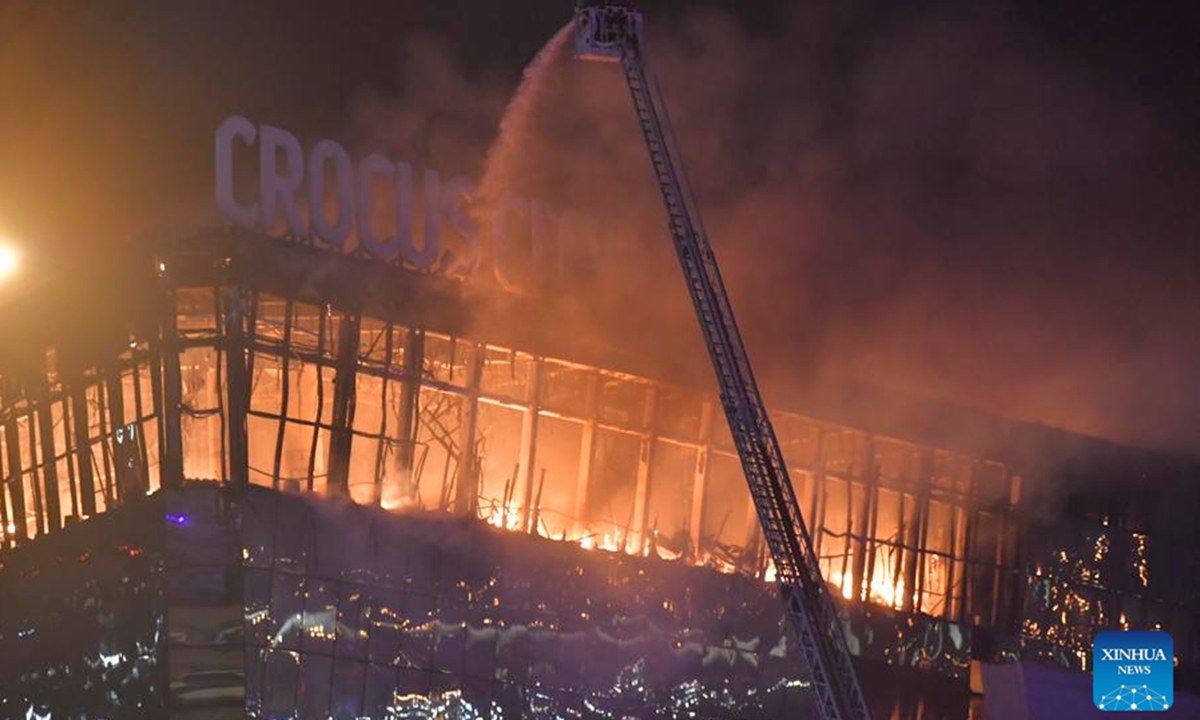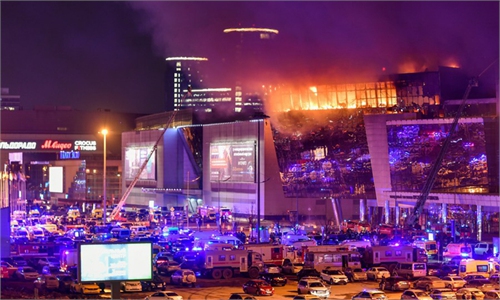Who is obstructing the creation of an international anti-terrorism coalition?: Global Times editorial

Rescuers battle a fire at the burning Crocus City Hall concert venue following a shooting incident in the northwest of Moscow, Russia, on March 22, 2024.(Photo by Alexander Zemlianichenko Jr/Xinhua)
On the evening of March 22, a shooting incident occurred in a concert hall in Krasnogorsk, a suburb of Moscow, the capital of Russia. The Russian authorities have classified this incident as a terrorist attack based on on-site investigations and situations. Following the incident, the extremist organization Islamic State-Khorasan Province (IS-K) claimed responsibility. Prior to this, major terrorist attacks occurred in Kabul, Afghanistan, Peshawar, Pakistan and Kerman, Iran, with the same organization issuing responsibility statements. This series of terrorist attacks once again demonstrates that international terrorism remains rampant, and the international counter-terrorism efforts still have a long way to go.The extremist organization represented by the so-called Islamic State (IS) is a product of the failure of Western intervention in the Middle East. Under the military strikes of the anti-terrorism coalition in multiple countries, especially Russia's high-pressure military actions in northeastern Syria, this extremist organization has largely lost its territorial control ability. However, several of its branch organizations have become active in different regions. The so-called IS-K that claimed responsibility for the recent terrorist attack on the concert hall in Russia is one of the most active international extremist organizations. The rise of this organization is also related to the geopolitical strategies of the US and the West. After the Biden administration came into power in 2021, it established a new strategic focus on great power competition. The hasty withdrawal of US troops from Afghanistan allowed the IS-K to quickly take advantage of the fluctuating regional security situation, reoccupying active space and becoming a major security threat in South Asia, Central Asia, and Russia.
This terrorist attack was the result of careful planning and meticulous organization by the extremist organization. In terms of timing, they chose a time when the Russian elections had just ended and security measures were relatively relaxed. In terms of target selection, they chose a cultural venue with dense crowds and relaxed emotions. From this, it can be seen that there have been some new changes in international terrorist activities, and international counter-terrorism efforts may enter a new stage. For example, regional extremist organizations like IS-K have begun to move beyond their traditional operating areas and carry out terrorist attacks in the core territories of their main targets. According to the investigation results released by the Russian side, there is no emphasis on suicide attacks in their methods, but rather a shift toward recruiting members through extremist organization networks, using money as a means rather than solely relying on extremist beliefs to attract "mercenaries," and so on. These new changes in terrorist attacks, carried out in a low-cost manner to garner international attention, will require adjustments in personnel, funding, and methods for the international counter-terrorism cooperation mechanisms previously established by various countries, thereby posing greater challenges and pressures to international counter-terrorism efforts.
For a long time, although the international community has reached some initial consensus on counter-terrorism issues, there are still many differences on key issues such as identifying terrorist organizations, sharing intelligence on terrorism-related information, and tracking terrorist activity funding, making it difficult to form an effective international united front against terrorist organizations and activities. In particular, the US and the West have persistently pursued their own interests in counter-terrorism issues, adopting double standards for a long time. They deliberately associate terrorism with specific countries, ethnic groups, and religions, using terrorist activities to provoke regional security conflicts, thus becoming the biggest problem and obstacle to the establishment of an international united front against terrorism.
This time, after the terrorist attacks in the suburb of Moscow, Washington claimed to have provided relevant warnings to the Russian side, but it did not mention the key information in the intelligence. Washington's condemnation of the terrorist attack also came relatively late, leaving the international community puzzled. Some Western public opinion began to speculate on the relationship between Washington and the event, and even the related extremist organizations. Practice has shown that adopting double standards and selective application in counter-terrorism issues essentially condones terrorist activities and undermines the effectiveness of international counter-terrorism cooperation.
After the recent terrorist attacks in Russia, many observers have associated the event with the "hybrid warfare" form of the Russia-Ukraine conflict. The suspected terrorists captured by Russia are mainly from underdeveloped areas in Central Asia, which once again highlights that regional conflicts and underdevelopment are still the main root causes of terrorism spreading and wreaking havoc. In the current situation where there is a lack of a unified international anti-terrorism front, the international community can actually start from the root, play the cards of development, cooperation, and harmony. In other words, the international community needs to help developing countries develop their economies, eliminate poverty, improve education, expand employment, prevent young people from being influenced and incited by extremist ideologies, while also intensifying efforts to politically resolve hot-button issues, stabilize the situation, promote equal dialogue and harmonious coexistence between different civilizations and religions, in order to shrink the space for extremist ideologies to survive and not give extremist organizations the opportunity to cause trouble.

